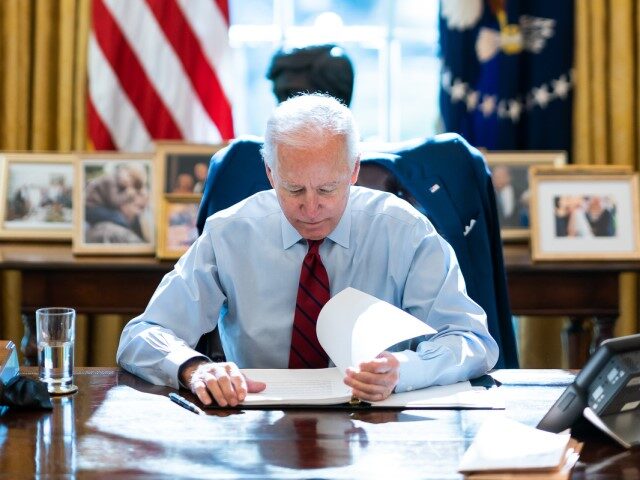Special Counsel Robert Hur’s report, which revealed a serious decline in President Joe Biden’s mental acuity, also details how Biden’s mishandling of the nation’s highest level of classified information appears to predate the investigation by years, Biden having seemingly misplaced a highly sensitive top secret (TS-SCI) classified briefing book while on vacation in the Hamptons as early as 2010, with his counsel forced to review with him how to handle classified material. The Special Counsel shockingly concluded he was “unable to determine” if the materials were ever recovered.
Special Counsel Hur’s investigation revealed that Biden had a history of mishandling classified documents, dating back to at least 2010, when he misplaced a highly sensitive briefing book in the Hamptons, demonstrating a pattern of carelessness with classified materials contrary to his public stance on responsible document handling.
While highlighting evidence of America’s oldest-ever president’s “willfully” mishandling classified documents, Hur’s report details Biden’s significant cognitive decline — perhaps more politically damning than his handling of classified materials.
The report, released Thursday, concludes that prosecution is unlikely due to the challenges of proving willful intent beyond a reasonable doubt and Biden’s sympathetic public image.
One key insight in the report appears in the third chapter, which deals with the handling of classified information in the Vice President’s office, and the efforts to retrieve and track the classified material.
According to the report’s account, at the start of Biden’s vice presidency, his first Counsel, Cynthia Hogan, directed his personal aide to ensure all classified documents received by Biden were returned to the Executive Secretary team, advising against storing any classified materials in the West Wing office and emphasizing the immediate handoff of such documents.
It also notes that the team responsible for managing classified materials often struggled to retrieve briefing books from Biden daily, as he sometimes retained them for personal reference or hadn’t finished reviewing them, and, occasionally, also removed documents from the books before returning them.
Hur referenced an incident from over a decade ago where Biden apparently lost a highly sensitive “Top Secret” briefing book in the Hamptons, highlighting the document’s high-security classification, which ranks among the government’s highest levels of sensitivity:
In 2010, the Executive Secretary team raised concerns about the number of classified briefing books that Mr. Biden had not returned, and the fact that, even when they were returned, some of the content was missing. These concerns were raised with Hogan as well as Mr. Biden’s personal aide and military aides. E-mails indicate that the Executive Secretary team alerted Hogan to the issue at least in June 2010, when nearly thirty of the classified briefing books from the first six months of 2010 were outstanding, and in August 2010, when Mr. Biden failed to return Top Secret, Sensitive Compartmented Information (also referred to as “codeword”) contents of a classified briefing book that he had received during a trip to the Hamptons, in New York. We were unable to determine whether these materials were ever recovered, although they were likely found and disposed of by military aides or naval enlisted aides [Emphasis added].
It further notes that days after the highly sensitive “codeword” book disappeared, Hogan drafted a memo in preparation for briefing Biden on proper classified material management, which included the following talking points:
“Classified information of any kind may only be reviewed or discussed in secured locations, and never in a public place such as on a train.”
“The [classified briefing] books must remain in your custody, or that of your cleared staff, at all times unless they are in your safe. Classified material must be returned to your national security staff as soon as you are finished with them.”
“Classified materials may never be left unattended, but must be secured in an appropriate safe or transferred to an individual authorized to transport them in an appropriate locked bag whenever they are not in your personal custody.”
“Whenever possible, classified materials should remain at the White House complex…. If you need to receive classified materials while at your residence at NAVOBS or in Delaware, the military aides will bring the material to you and then wait to take the material back when you are finished so that it can be stored safely.”
Though Hogan didn’t recall the meeting when interviewed, she recognized her handwritten talking points on “best practices,” and had even received an e-mail afterward thanking her for the “security briefing.”
According to the report, Hogan viewed her memo on handling classified information as outlining “best practices” rather than legal requirements, in line with the executive order that does not apply to a sitting vice president, further noting that Biden and his staff “did not follow Hogan’s guidance to the letter.”
Ironically, it was Biden himself in 2022 who attacked former President Donald Trump over accusations of mishandling classified documents at Mar-a-Lago, claiming he was astonished “how that could possibly happen” or “how anyone could be that irresponsible.”
In September, Joe Biden was asked about the classified documents at Mar-a-Lago.
He said he didn't know "how anyone could be that irresponsible" and questioned "what data was in there that may compromise sources and methods?" pic.twitter.com/jvw8FcBZZj
— Jake Schneider (@jacobkschneider) January 10, 2023
Biden’s statement came four months before CBS News reported that a Biden think tank had been storing ten classified documents at the Penn Biden Center for Diplomacy and Global Engagement in Washington.
Joshua Klein is a reporter for Breitbart News. Email him at jklein@breitbart.com. Follow him on Twitter @JoshuaKlein.

COMMENTS
Please let us know if you're having issues with commenting.